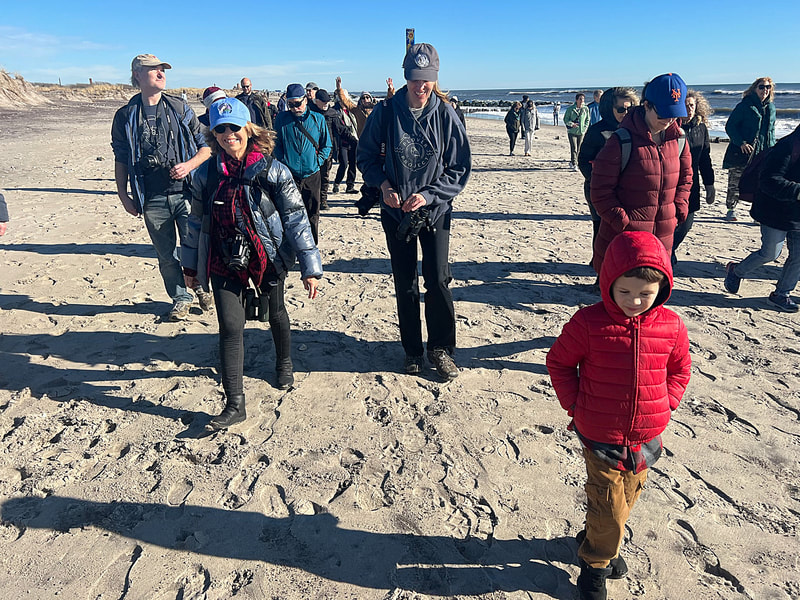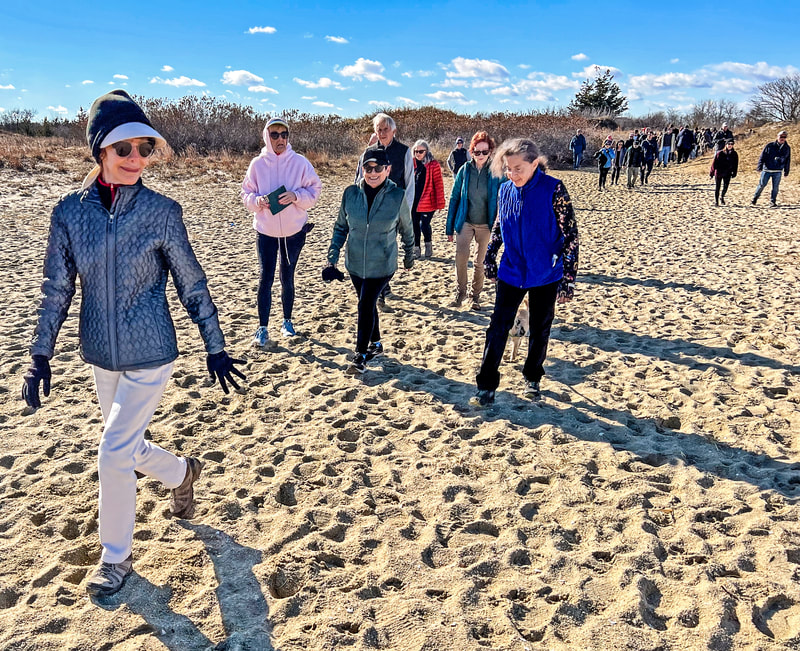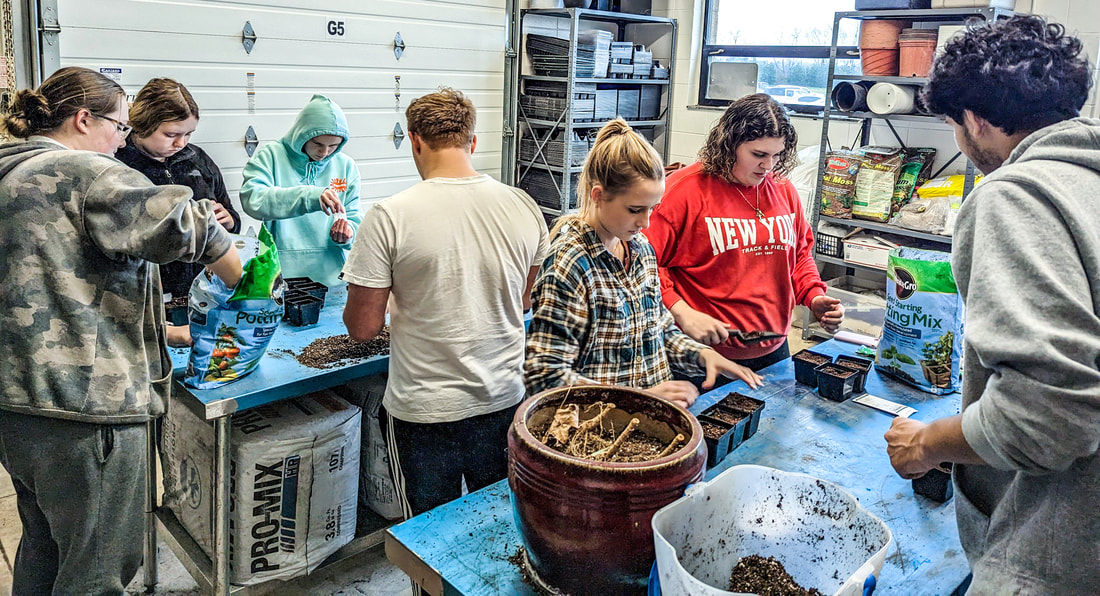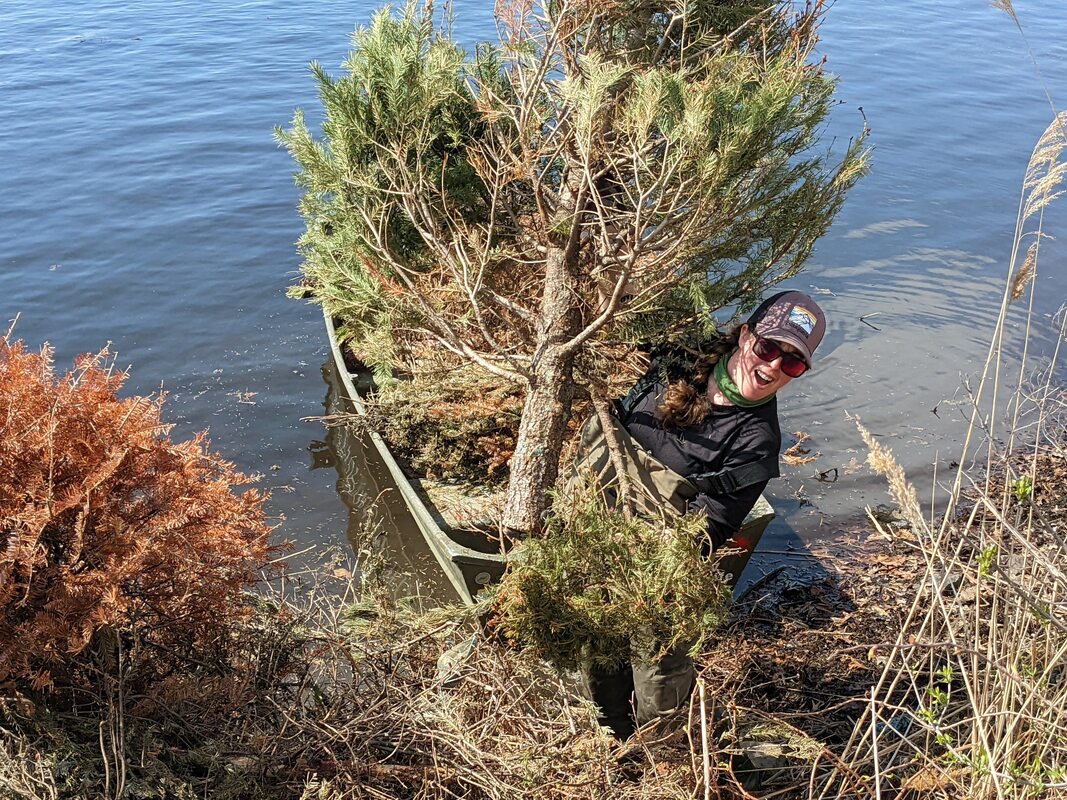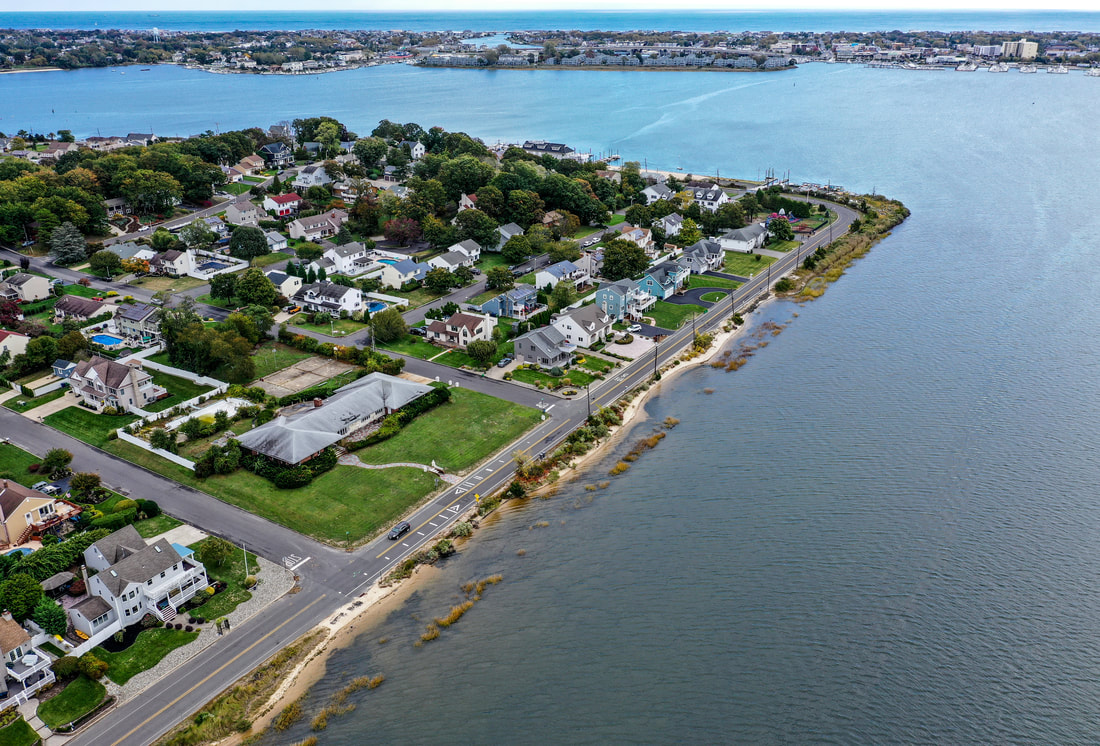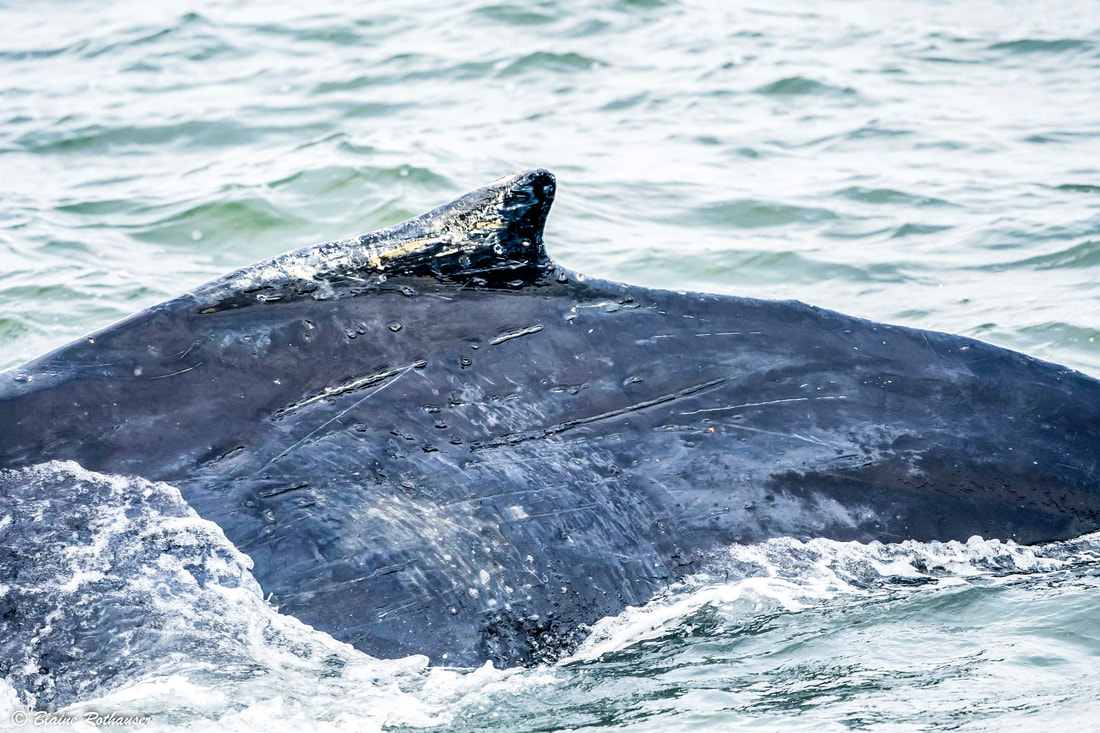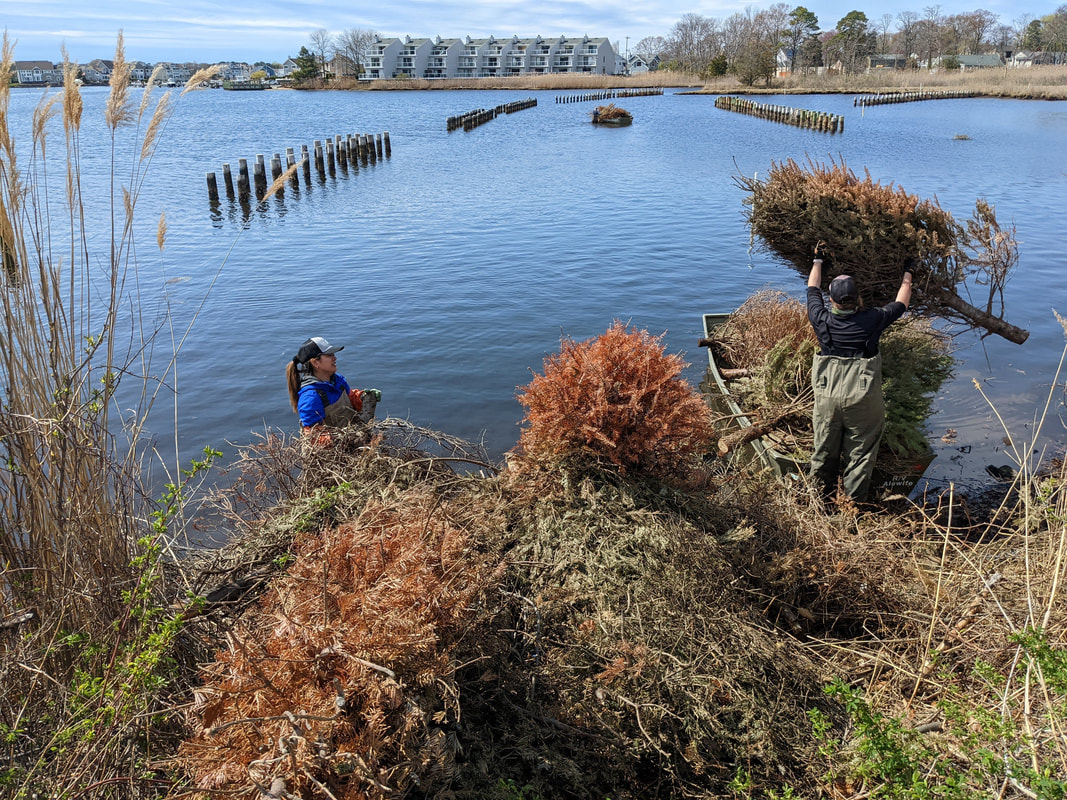|
Thanks to fantastic weather, the Littoral Society enjoyed a great turn out for our annual New Year's Day walks on Sandy Hook, NJ and Breezy Point, NY. Buoyed by temperatures in the 50s, more than 200 folks gathered for the trek to the tip of Sandy Hook and about 50 joined us for the walk through New York's Fort Tilden. The annual ritual to ring in the new year, which has been occurring for more than 30 years, included attempts by both parties to signal the other. While we failed in that effort (once again), we hope everyone will join us for another try on January 1, 2024. The New York group also celebrated some very important milestones for one of the youngest naturalists on the walk … with cake of course! On Sandy Hook, the event culminated with hot dogs and hot chocolate at Littoral Society headquarters. Thanks to everyone who joined us for these events and we look forward to making the walk again with you next year. Littoral Society Kicks Off Environmental Stewardship Program with Students at South Jersey High School Over the past 5 months, students in Agriculture Research and Development and Animal Science classes at Cumberland Regional High School (CRHS) explored the impacts of climate change and habitat loss on pollinators while getting their hands dirty in an environmental stewardship project led by the American Littoral Society.
The project, called Helping Pollinators Help Us: Creating Habitat for Climate Change Resilience, was launched in the Fall of 2022 with funding from the National Oceanic and Atmospheric Administration Planet Stewards program (NOAA). The pollinator project at CRHS is led by Nicole Smith, the school's Agriculture Teacher and FFA Assistant Advisor, and Michelle Rebilas, Littoral Society’s Delaware Bay Education Coordinator. For the two-year project, students will be engaged in hands-on conservation and stewardship experiences that build skills and confidence in their individual and collective ability to make a difference in their community. As part of that they learned about the threats to pollinators like bees and butterflies in the face of climate change and developed a strategy to increase pollinator habitat availability and connectivity on their school campus. The initial semester of work included three phases: Pollinator Study & Monarch Conservation, Habitat Planning & Design, and Growing Pollinator Plants in a Greenhouse. The project will culminate with the creation of a 1-acre pollinator habitat on the campus of Cumberland Regional High School in Spring 2023. The Littoral Society remains in the holiday spirit thanks to the ongoing collection of used Christmas trees for the Slade Dale restoration project.
Point Pleasant Borough's department of public works (DPW) continues to collect residents' natural trees that have been left by the curb and anyone can drop theirs off at the town's Good Shepherd Lutheran Church through the end of January. In addition to those from the local DPW and individuals, we've also received trees from the Brielle Environmental Commission. The trees will be collected for use in an ongoing living shoreline project at the Slade Dale Sanctuary, a 15-acre municipal property on Sea Point Drive. In the spring, trees that have been collected will be put into into branchbox breakwaters, which are wooden structures set in Beaverdam Creek that are designed to control erosion by using trees and brush to slow currents and waves, as well as capture the sediment being carried in the water. The breakwaters to help reduce wave energy which can erode the shoreline and allow the salt marsh at the sanctuary to build back up. Over the past two months, work has been underway in Neptune Township, NJ to build a living shoreline that will help protect the surrounding community from storms and waves, reduce flooding impacts, and create habitat for wildlife.
The project along South Riverside Drive in the Shark River Hills section of the township, will include placement of special "mattresses" and coir logs to stabilize the shoreline, raising the beach and building a dune to provide added resiliency during storm or high-tide events, adding native plants, and long-term monitoring of the site. The initial phase of the project is nearing completion. It has involved creating a marsh sill with Tensar mattresses - large, mesh polymer bags that are filled with rock and shell that have been placed in the Shark River just beyond a dilapidated wooden bulkhead; lining nearly 2,000 feet of shoreline with coir "logs" made from coconut husks; pouring tons of sand onto the beach; and building a small dune with walkways for the public to access the beach. With the start of the new year, the Littoral Society began a series of eco-cruises in partnership with the Seatstreak Ferry. While the 3-hour excursions - which will continue out of Highlands, NJ every Saturday through the end of March - are predominantly for seeing seals and birds, we saw some unexpected visitors during the inaugural voyage.
Unfortunately, we didn't see huge numbers of seals - likely due to high tides covering their preferred haul-out spots. However, we were very fortunate to encounter two or three juvenile humpback whales! While whales are becoming increasingly common in this area, they are more typically seen in the spring. For many of the more than 60 people onboard, this was their first time spotting a whale. During the trips, Littoral Society staff and trained naturalists guide participants in spotting and identifying various wildlife, while also discussing the lives and habitats of what we see. Depending on the days route, we may sail by landmarks such as the Verrazzano Bridge, Roamers Shoal Light, Coney Island, Sandy Hook Light and others spots around Sandy Hook. 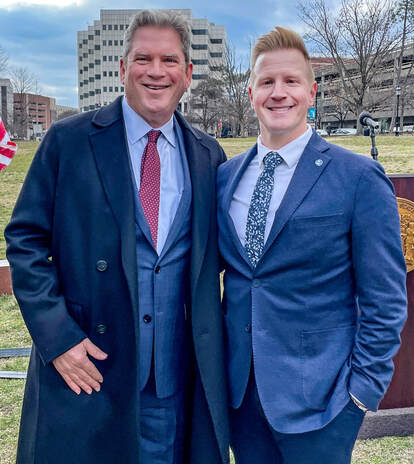 NJ Department of Environmental Protection Commissioner Shawn M. LaTourette (R), with Tim Dillingham, Executive Director of the American Littoral Society. NJ Department of Environmental Protection Commissioner Shawn M. LaTourette (R), with Tim Dillingham, Executive Director of the American Littoral Society. The American Littoral Society has been named one of the initial recipients of a New Jersey grant program designed to fund projects that use nature-based techniques to combat the effects of climate change. As part of this program, the Littoral Society's project for restoring marshlands at the mouth of the Maurice River will receive funding through the new Natural Climate Solutions Grant Program. This innovative program, one of the first of its kind in the nation, is funding $24.3 million in projects to mitigate climate change by creating, restoring, and enhancing New Jersey’s green spaces and tree canopies in urban areas, as well as natural carbon sinks, such as salt marshes, seagrass beds, forests, and parks. Grant recipients were congratulated by NJ Department of Environmental Protection Commissioner Shawn M. LaTourette during an event in Trenton on Wednesday, Jan. 18. “We appreciate the confidence of the Commissioner and the Department in awarding us this grant to undertake this necessary work," said Tim Dillingham, Executive Director of the American Littoral Society. "New Jersey is Ground Zero for the impacts of climate change and harnessing the power of nature is the most effective response available to us. Our project takes place in one of the most vulnerable communities along the Delaware Bayshore and we thank the Murphy Administration for bringing attention and resources to partner with this community as it faces the impact of climate change." Christmas trees can keep on giving, even after the holiday season has come to an end. The American Littoral Society will be using recycled trees for an ongoing living shoreline project in Point Pleasant Borough, NJ. Residents of the borough can simply leave their trees - with all decorations removed - at the curb for collection by the Department of Public Works.
If you aren't a resident of the borough, you can still donate trees. The drop off site is at Good Shepherd Lutheran Church, 708 NJ-88 in Point Pleasant. Donated trees will be used in what are known as branchbox breakwaters - wooden structures set in Beaverdam Creek that are designed to control erosion by using trees and brush to slow currents and waves, as well as capture the sediment being carried in the water. |
Archives
July 2024
Categories
All
|

